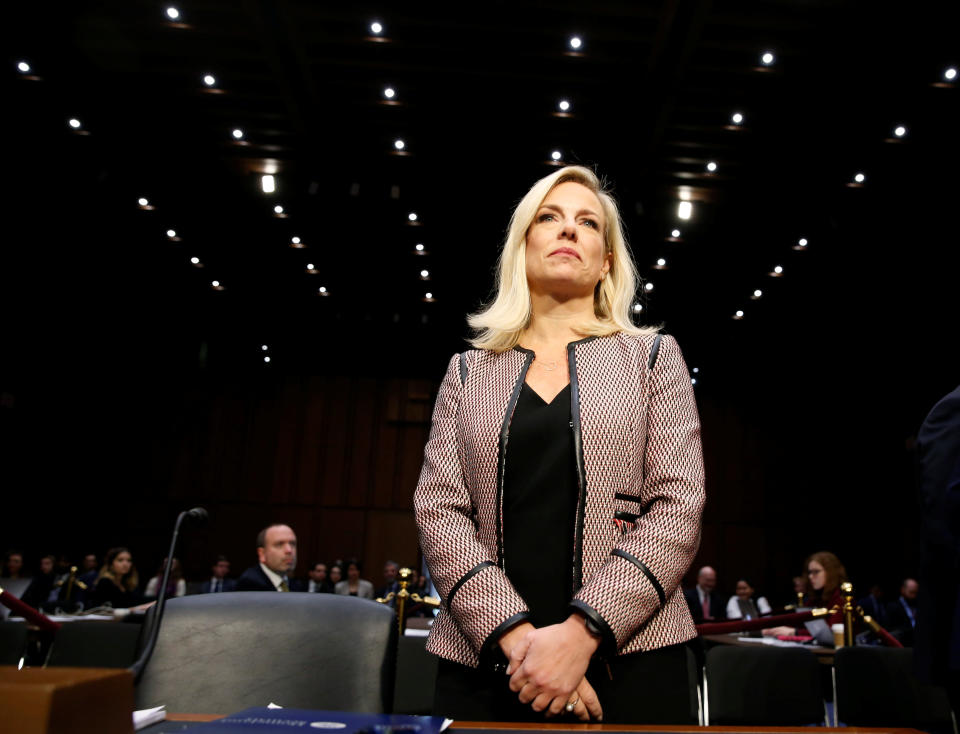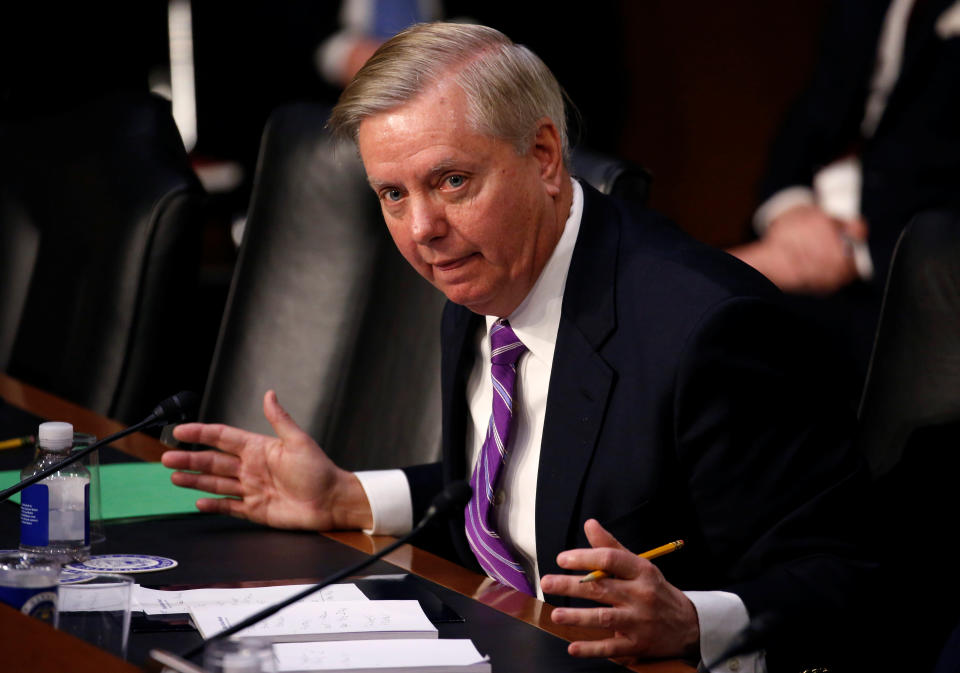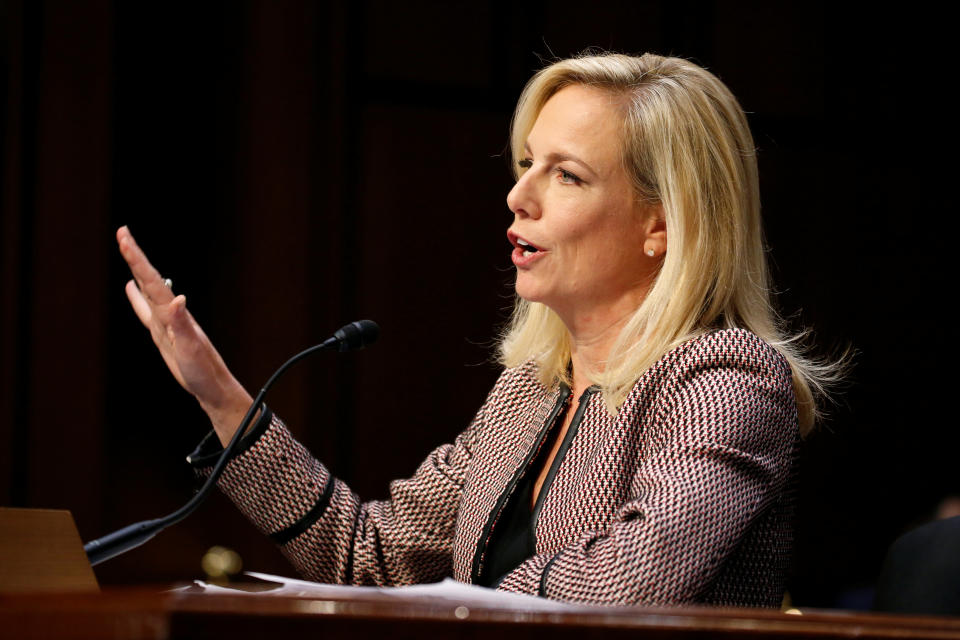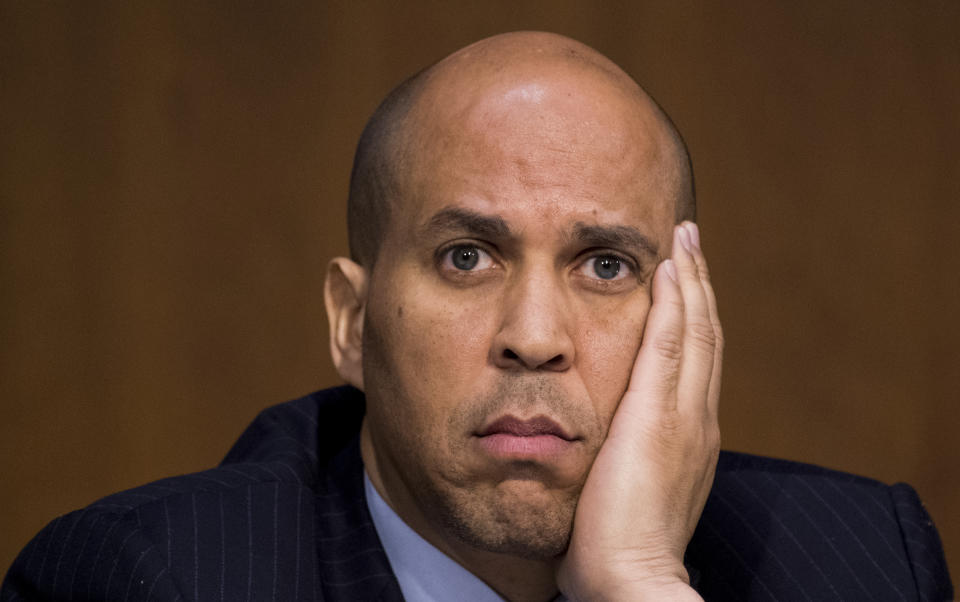DHS secretary defends Trump amid immigration firestorm: 'We'd like to have people with skills'
Homeland Security Secretary Kirstjen Nielsen defended President Trump’s incendiary comments about immigrants from Haiti and various African countries before the Senate Judiciary Committee Tuesday morning.
Testifying under oath at a previously scheduled oversight hearing, Nielsen engaged in heated exchanges with Democrats over what she recalled Trump saying at the much-discussed closed-door meeting on immigration reform last week.
Dick Durbin, D-Ill., the only Democrat who attended the White House meeting, asked Nielsen to recall what Trump had said.
“What I heard him saying was that he’d like to move away from a country-based quota system to a merit-based system. So it shouldn’t matter where you’re from. It should matter what you can contribute to the United States,” she answered.
Durbin asked about reports in the Washington Post that Trump called Haiti and African nations “shitholes” — which Durbin himself has publicly confirmed. “How did he characterize those countries in Africa?” he asked.

Nielsen said she couldn’t specifically remember “the categorization of countries in Africa” because those gathered were speaking over each other and there was “a lot of rough talk.”
“Do you remember the president saying expressly, ‘I want more Europeans. Why can’t we have more immigrants from Norway?’” Durbin asked.
Nielsen said Trump brought up European nations during a conversation about removing the diversity lottery. According to Nielsen, Trump was asking if the spots reserved for the diversity lottery would be assigned to underrepresented countries in U.S. immigration and whether this would apply to European countries.
Slideshow: Activists hold Martin Luther King Jr. Day marches >>>
“From that perspective, I think he did ask, ‘Would that cover European countries, or by its very nature would that mean we are purposefully establishing immigration to exclude Europeans?’” she said.
Durbin asked what Trump said specifically about immigrants from Norway.
“I heard him repeating what he had heard in a meeting before. That they are industrious, a hard-working country. They don’t have much crime there. They don’t have much debt. I think in general I just heard him giving compliments to Norway.”

Durbin pointed out that Nielsen, during an appearance on Fox News, claimed she could not recall whether Trump used vulgar language. She repeated to the Senate Judiciary Committee that she could not remember Trump’s specific words because “nearly everyone” in the room was using profanity.
“Did you hear me use profanity?” Durbin asked.
“No, sir. Neither did I,” she said.
“Did Senator Graham use profanity?”
“I did hear tough language from Senator Graham, yes,” she said.
Durbin explained that Graham had been citing Trump’s language to admonish the president for what he regarded as a slur against Africans, and said he respected Graham, a Republican who has been an occasional Trump critic — and frequent supporter — for taking a principled stand.
He said Graham reminded the president that the Trump family “did not come to America with great skills or wealth, but they came here as most families do, looking for a chance to prove themselves and make this a better nation.”

Graham, who was also at Tuesday’s hearing, said he had expected the meeting last week to be cordial and productive; earlier that same morning, Durbin had briefed him on a phone call with Trump that suggested a fair and bipartisan agreement was within reach. But this sympathy and evenhandedness was apparently gone by the testy meeting.
“So what happened between 10 and 12?” Graham asked. “I’m going to find out, and I’m not going to ask you because, between 10 o’clock and 12 o’clock we went from having conversations between Sen. Durbin, which I believe every word, and the president that was very hopeful, and by the time we got there something had happened.”
Graham said just days before he was proud to golf with Trump and call him his friend, but that it had all changed by Thursday.
“Now, I don’t know where that guy went. I want him back,” Graham said.
Nielsen praised Graham and Durbin’s leadership and recalled approaching Durbin after the meeting to discuss working toward an agreement on immigration reform.
Earlier in the hearing, Sen. Pat Leahy, D-Vt., called Trump’s comments “the most vulgar and racist thing I’ve ever heard a president of either party utter.”

“In fact, I’ve never heard any president, Republican or Democrat, utter anything even similar. Now he denies using these specific words,” he said.
Nielsen told Leahy that she did not hear Trump use “that word,” referring to “shithole.”
“The conversation was very impassioned. I don’t dispute that the president was using tough language. Others in the room were also using tough language,” she said.
Leahy expressed skepticism of Nielsen’s interpretation that Trump was advocating for a merit-based immigration system like those in Australia or Canada, noting that he didn’t use phrases like “PhD students” or “skilled workers.”
“He said that he wanted more people from Norway. Being from Norway is not a skill,” Leahy said. “And with the standard of living in Norway better than ours, you’re not going to have too many people from there. What does he mean when he says he wants more immigrants from Norway?”
According to Nielsen, Trump was using Norwegians as an example of people who work very hard and could make significant contributions to American society. She said Trump was referring specifically to what Norwegian Prime Minister Erna Solberg said about the industriousness of her citizens during their meeting the day before.
“So what he was saying, from a merit-based perspective, is we’d like to have people with skills who can assimilate and contribute to the United States, moving away from country quotas and to an individual merit-based system,” she said.

“Norway is a predominantly white country, isn’t it?” Leahy asked.
“I actually do not know that, sir, but I imagine that is the case,” she responded.
Trump was roundly condemned for his comments during the immigration meeting, and he claims that people like Durbin have “totally misrepresented” what he said. Others have defended the president. Sen. David Perdue, R-Ga., for instance, claims that Trump did not use the language Durbin attributed to him. Graham, while avoiding quoting Trump directly, has made public comments that support the gist of the Washington Post account.
Although this was among the more inflammatory topics covered during the hearing, Nielsen’s opening statement outlined four issues she wants to be addressed to secure the nation: giving U.S. authorities the ability to quickly remove people who immigrate into the U.S. illegally; ending the diversity lottery that gives visas out to people from countries that haven’t sent many immigrants to the U.S.; ending family-based chain migration; and finding a permanent solution for the Deferred Action for Childhood Arrival (DACA) recipients.
In her assessment, the U.S. faces a serious and persistent terror threat that will not weaken anytime soon. She called on Congress to pass a DHS reauthorization bill that would increase her department’s ability to confront contemporary threats to the nation.
“We can’t keep the United States and its citizens secure with authorities drafted for a different era, to address the threats of the last decade. We need updated authorities, updated support and updated accountability for the world we live in today.”
Slideshow: Miami Haitians condemn Trump on 8th anniversary of earthquake >>>
Nielsen, a longtime aide to White House Chief of Staff John Kelly and an expert on cybersecurity, briefly served as Kelly’s principal deputy last year. She joined the administration in that capacity on Sept. 6, 2017, but Trump nominated her on Oct. 11 to lead the DHS. The Senate confirmed her nomination on Dec. 5 with a 63 to 37 vote — the tightest margin ever for that position — and she was sworn in the next day.

Sen. Cory Booker, D-N.J., said that listening to Nielsen’s testimony made it apparent she doesn’t appreciate how hurtful Trump’s comments were. Booker, who is African-American, said he owes his success to “good white people,” civil rights advocates who stood against bigotry. He said hearing about Trump’s words in the Oval Office disturbed him deeply, and that they were on the minds of the many people he’s encountered over the past week — from everyday Americans to luminaries of the civil rights movement.
“Now, I’ve been in the Oval Office many times. And when the commander in chief speaks, I listened. I don’t have amnesia on conversations I had in the Oval Office going back months and months and months,” Booker said.
Describing himself as “frankly seething with anger,” Booker reprimanded Nielsen for having “convenient amnesia” and for standing by in the face of bigotry. Paraphrasing civil rights hero Martin Luther King Jr., Booker said neutrality only empowers the oppressor — never the oppressed.
“Your silence and your amnesia is complicity,” Booker said. “I’ve got a president of the United States, an office that I respect, who talks about the countries of origins of my fellow citizens in the most despicable manner. You don’t remember! You can’t remember the words of your commander in chief! I find that unacceptable,” Booker said.
He openly doubted whether Nielsen spent much time at the DHS cracking down on white supremacist hate groups that target African-Americans and other minorities. She responded that she abhors violence in all its forms and that the department’s programs have recently been reassessed to address this threat.
“I share your passion. It’s unacceptable. it can’t be tolerated in the United States. Under the authorities that I have at the Department of Homeland Security, violence in any form will not be tolerated,” she said.
Read more from Yahoo News:


